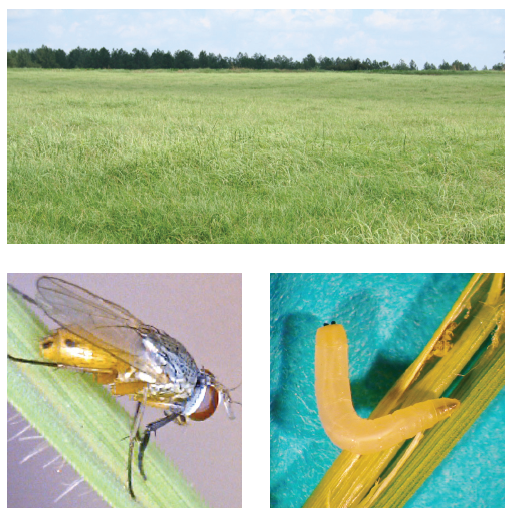
Bermudagrass stem maggots (Atherigona reversura) are a relatively new pest of Bermudagrass hayfields in the Southeast, only being discovered in the region in 2010. Identifying the damage is fairly easy, it looks like a light frost has burnt the top growth of the plants. The adult stage of this pest are small flies. The flies lay eggs in Bermudagrass fields. The maggots or larva hatch and burrow in the top node of the plant and feed, eventually killing the top leaf shoot. The primary issue is with Bermudgrass pastures managed as hay-fields. Grazing prevents extensive population buildup, as livestock consume the tiny maggots along with the grass and prevent development into adult flies.
The damage to a hayfield comes from yield and quality losses, not lasting damage to the plant. The seriousness of the losses caused by this pest varies considerably depending on the growth stage of the grass, the addition of drought, and the population density of the flies in the area. As populations of the adult flies increase through the summer, more and more of a hay field is damaged by the maggot stage of the insect. The maggots feed on the primary shoot from the top node of the Bermudagrass plant. The fly has a life cycle of 12-21 days, so multiple generations of maggots can hatch in between hay cuttings.
There still is not a lot known about how to best manage this pest, or the what the economic thresholds for treatment should be. Current management recommendations for serious infestations are:
- Harvest the grass to help break the life cycle
- Spray pyretrhoid insecticides labeled for hayfields after grass regrowth two times, 5-7 days apart to kill the adult flies
Alabama Extension has developed a fact sheet and a YouTube video to help producers identify and minimize Stem Maggot damage to Bermudagrass hayfields.
 1
1
